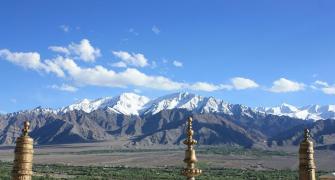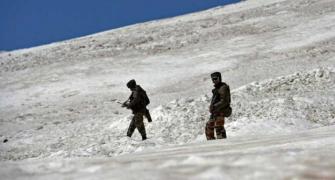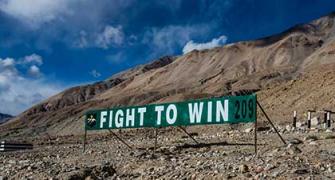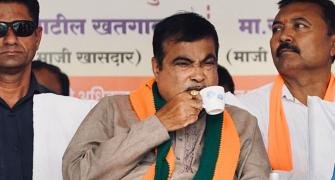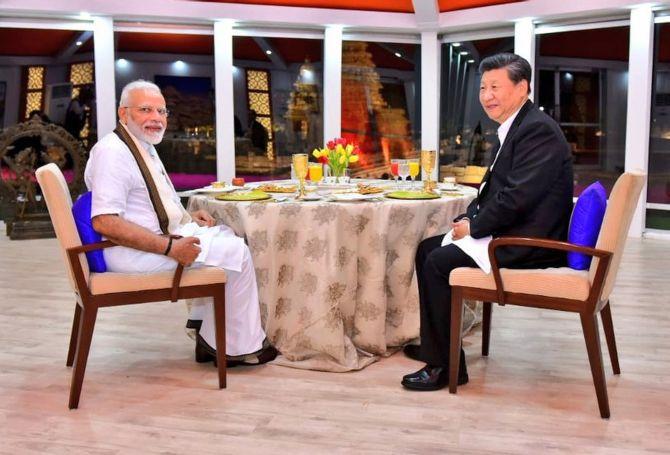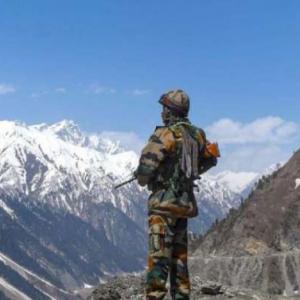Narrowing of differences on competing territorial claims along the LAC might take weeks, if not months, of hard-nosed negotiations.
Without some give and take on both sides, the impasse will be hard to resolve, observes Virendra Kapoor.

Let us not delude ourselves.
We may be far better equipped than in 1962 when Nehru's ill-considered forward policy ended most disastrously.
But despite huge strides in building our economy, military, and other necessary infrastructures, we still have a long way to go before we can match China militarily and economically.
Yet, India is no pushover.
Not long ago, a relatively small Vietnam had brought to its knees the greatest military power of the time.
China and India being nuclear powered, not even in their worst nightmares would Beijing and New Delhi chance, even by accident, a major border conflagration.
Again, with an ultra-nationalist BJP as the ruling party at the Centre with a strong leader like Modi as prime minister, it can be completely ruled out that India would countenance anything less than an honourable solution to the latest stalemate.
The latest incursion into the Indian territory too will require patience and tactfulness which India had displayed in earlier Chinese provocations.
There is no reason to believe that it will be found wanting this time.
Circumstances change, of course.
Both countries aspire to be global powers. China is at least two decades ahead, India having lost its way thanks to retrograde and wrong-headed economic and political policy regimens, is still playing catch up.
On all available evidence, it is clear the standoff is unlikely to end anytime soon.
Narrowing of differences on competing territorial claims along the un-demarcated Line of Actual Control might take weeks, if not months, of hard-nosed negotiations.
Without some give and take on both sides, the impasse will be hard to resolve.
China violated the LAC and moved into the Indian territory early in May.
The Indian border guards were caught napping.
Fear of the coronavirus, it seems, made them lower guard when the Chinese pushed into the Indian side in the course of their annual exercises.
It is not the first time that China has breached the unwritten agreement to respect the LAC.
Despite efforts to negotiate a settlement, the two governments have failed.
In the early years after Independence, the Chinese leadership seemed keen to settle but Nehru was disinclined.
However, once India gave the Dalai Lama and his loyal band of followers shelter in 1959, China's stance hardened.
The flawed policies of the Nehru-V K Krishna Menon combine finally invited the humiliating rebuff in 1962.
Now, having acquired greater economic and military heft, China projects power through its robust foreign policy.
Aside from North Korea, there is probably no country in its neighbourhood which does not feel browbeaten by the Chinese flexing of the military and economic muscle.
China openly bullies its smaller neigbhours. And, above all, it seems to be in open confrontation with the US, Europe and other countries which resist its predatory trade practices.
The short point is that China may be feared, but it is not respected in world capitals.
Even at the height of the Cold War, the US was mindful of public opinion and did not ramrod its policies on unwilling democratic countries.
In sharp contrast, China seeks to force itself on its neighbours.
Consider how it has defied the International Court of Justice to annex islands in the South China Sea.
Or its recent economic intimidation of Australia when the latter merely called for an independent investigation into the spread of the coronavirus from Wuhan.
Coming back to the India-China skirmishes along the LAC, for India a complete withdrawal of the People's Liberation Army from the territory it occupied early last month has to be non-negotiable.
Heightened nationalist sentiment at home will not permit anything less.
The 2017 Dokalam standoff provides an insight.
The dispute over China's building of a road on the border with Bhutan -- which would have endangered India's strategic link to the North-East through what is called the Chicken's Neck in Siliguri -- was finally resolved to New Delhi's satisfaction after months of negotiations.
Now the Chinese object to India upgrading its road and air infrastructure, connecting the border with an all-weather Daulat Beg Oldi road.
This is an after-thought. India has been building that road for over a decade. No objections were raised at anytime till now.
Or there could be other reasons for China's erratic behaviour.
After the local level talks failed to yield result, these were upgraded to the level of the corps commander.
The first round resulted in both sides pulling back by a kilometre or two, but there was no withdrawal by the Chinese from the crucial Pangong Tso Lake in the vicinity of the Daulat Beg Oldi road.
The talks are likely to resume in the next few days.
A Chinese foreign ministry spokesman said last week that the two countries had 'reached agreement' on the ongoing border tensions, leading to 'partial disengagement' from some points on the LAC.
It is hoped that eventually the Chinese will pull back from the critical Pangong Tso lake as well.
That point is strategically critical for them because it allows easier movement to parts of the territory in Kashmir that Pakistan had 'gifted' to China.
Crucially, it links the Tibetan plateau to the Uighur-Muslim dominated Xinjiang.
At the heart of the aggressive Chinese policy might be President Xi Jinping's need to project strength at home and abroad.
Having arranged to have himself anointed Leader for Life, Xi needs to always watch over his shoulder for intrigues and manipulations by aspiring rivals in the Chinese Communist Party.
Playing Superman to the world at large raises his stock at home.
See how he seeks to crush Hong Kong's autonomy and openly threatens annexation of Taiwan through military action.
The way the Wuhan origin virus was tackled, with the authorities trying their best to prevent information about it leaking to the outside world, was sheer arrogance and a betrayal of the suffering humanity.
China has lost public goodwill.
Its unprovoked aggression against India cannot redound to its credit in the world councils either.
India is capable enough to sort out the problem bilaterally, but it helps that the larger global community stands with it on this wholly unprovoked Chinese aggression.
Production: Aslam Hunani/Rediff.com

